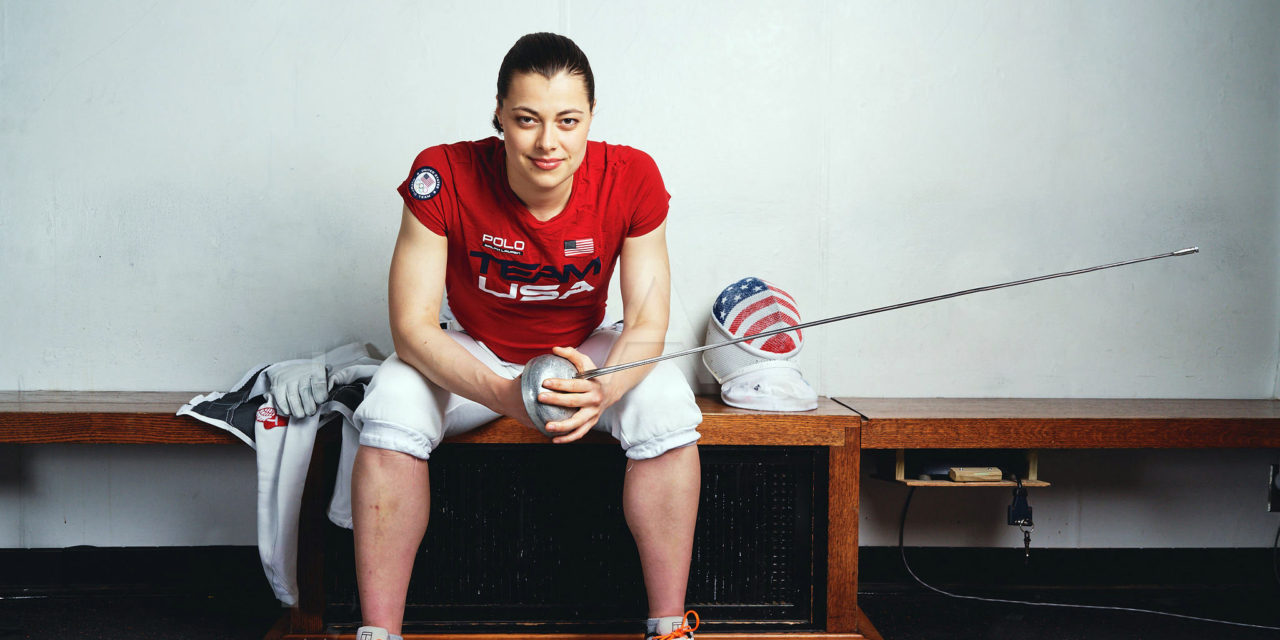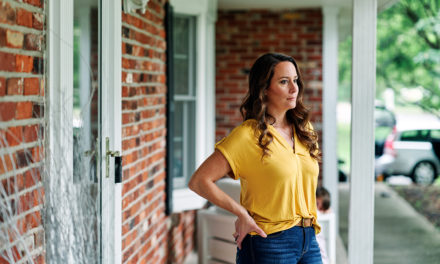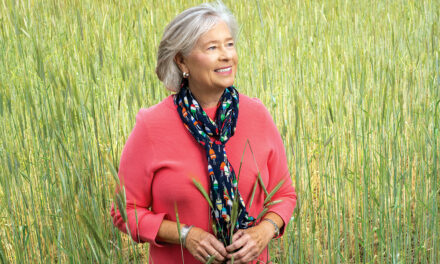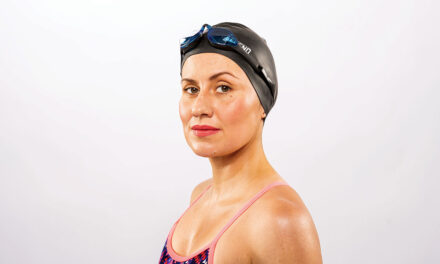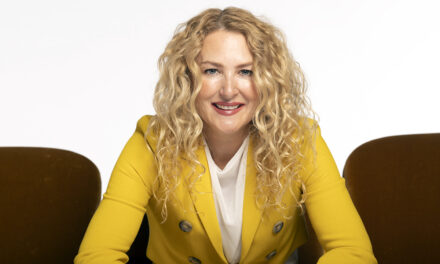Already one of the best closers in fencing, she is in hot pursuit of a gold medal at the 2020 Olympic Games in Tokyo, training 6-8 hours a day at Princeton University. But that’s just one of her dreams. When she comes home, she’ll start medical school so she can begin a career as an orthopedic surgeon.
In the deciding match at the 2018 FIE World Championships in Wuxi, China last July, South Korea’s Choi In-Jeong lunged with her right leg and attacked low, giving American Katharine Holmes just a millisecond to respond. But she was ready, prepared to attack, and with her opponent off balance, she flicked her épée at In-Jeong’s mask and scored the crucial point in the one-touch overtime. Holmes yanked off her mask, raised her arms with her épée up high in the air, and shouted in victory toward her three teammates. They had just become the first American team to win a World Championship in fencing, and Holmes etched the deciding victory.
She was emotional in victory, but her win was actually the result of countless hours of methodical, careful study, in addition to the years of rigorous training.
Having lost in an overtime match at the Rio 2016 Olympic Games, resulting in a placing fifth in the standings instead of the coveted gold, Holmes, now 25, decided to use her senior thesis in Neuroscience at Princeton to solve the problem. The topic—“How Risk Preference and Perception of Action Riskiness in Fencing Affect Learning and Strategy of Fencing Play”—required Holmes to watch hours of fencing videos, recording outcomes to determine a predictive model.
She developed a computer game in which fencers and non-fencers would play against virtual opponents who attacked and defended with ratios calculated from watching videos. “In the end, I found that fencers actually attack less than what is optimal,” says Holmes. She learned that while many fencers know they should attack but end up defending because “getting hit is more emotionally painful than hitting is emotionally satisfying so we get stuck at the equilibrium point.”
She calculated that when the score is tied, attacking actions are 1.5 times as likely to score than defensive actions. She used the results on paper to help her improve her performance in live competitions. “I adjusted my approach in one-touch overtimes, and my win percentage went from 60 percent to 88 percent,” says Holmes, a Washington, DC native.
And that’s how Holmes became one of the best closers in the sport and got her one step closer to winning a gold medal in Tokyo next summer.
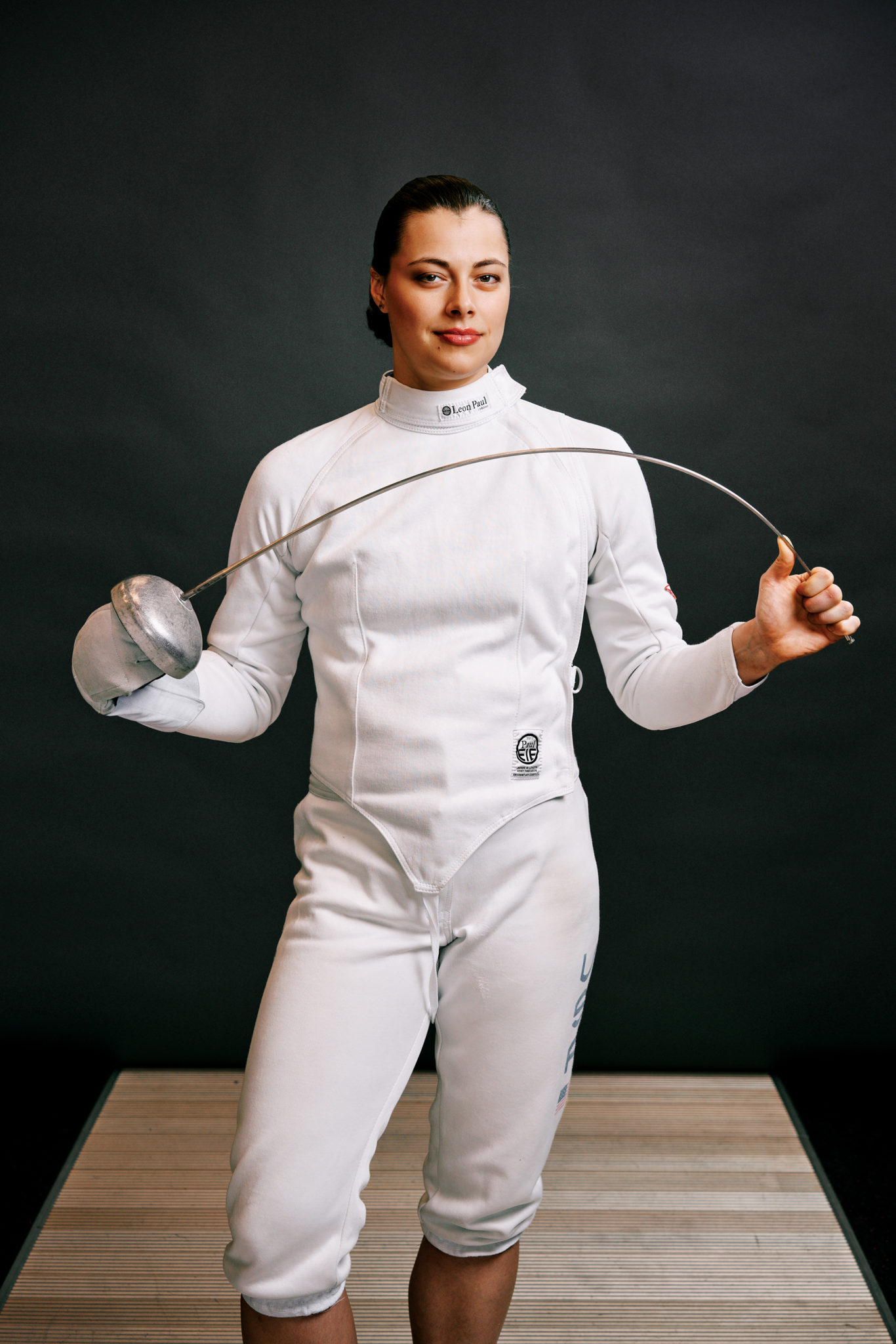
They call fencing the chess of sports. When you’re younger, you’re playing basketball, tennis, or soccer—you kick the ball, you hit the ball. With fencing, there’s this puzzle before you. Plus, you’re using a sword, so as a kid that’s so cool.
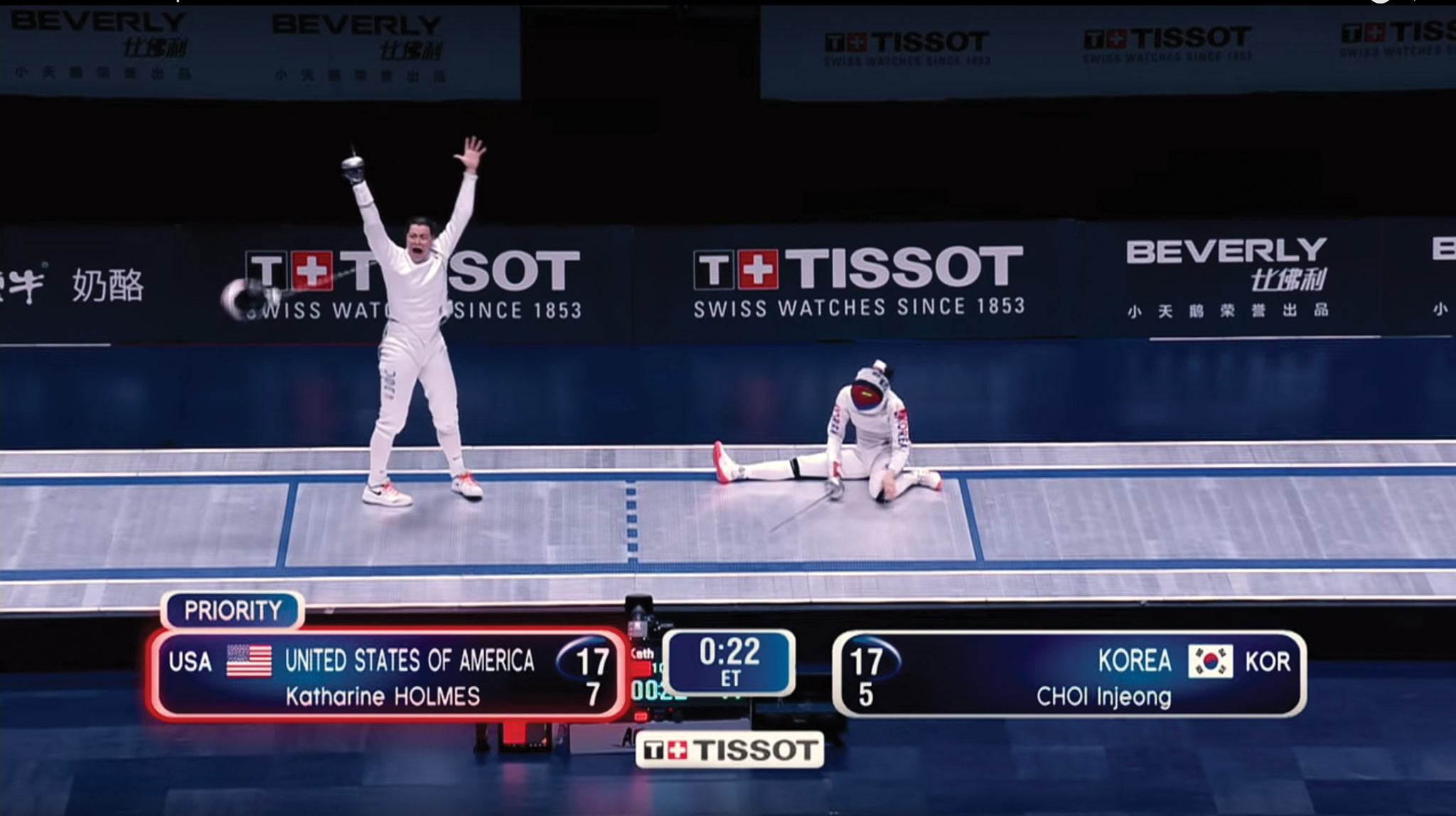
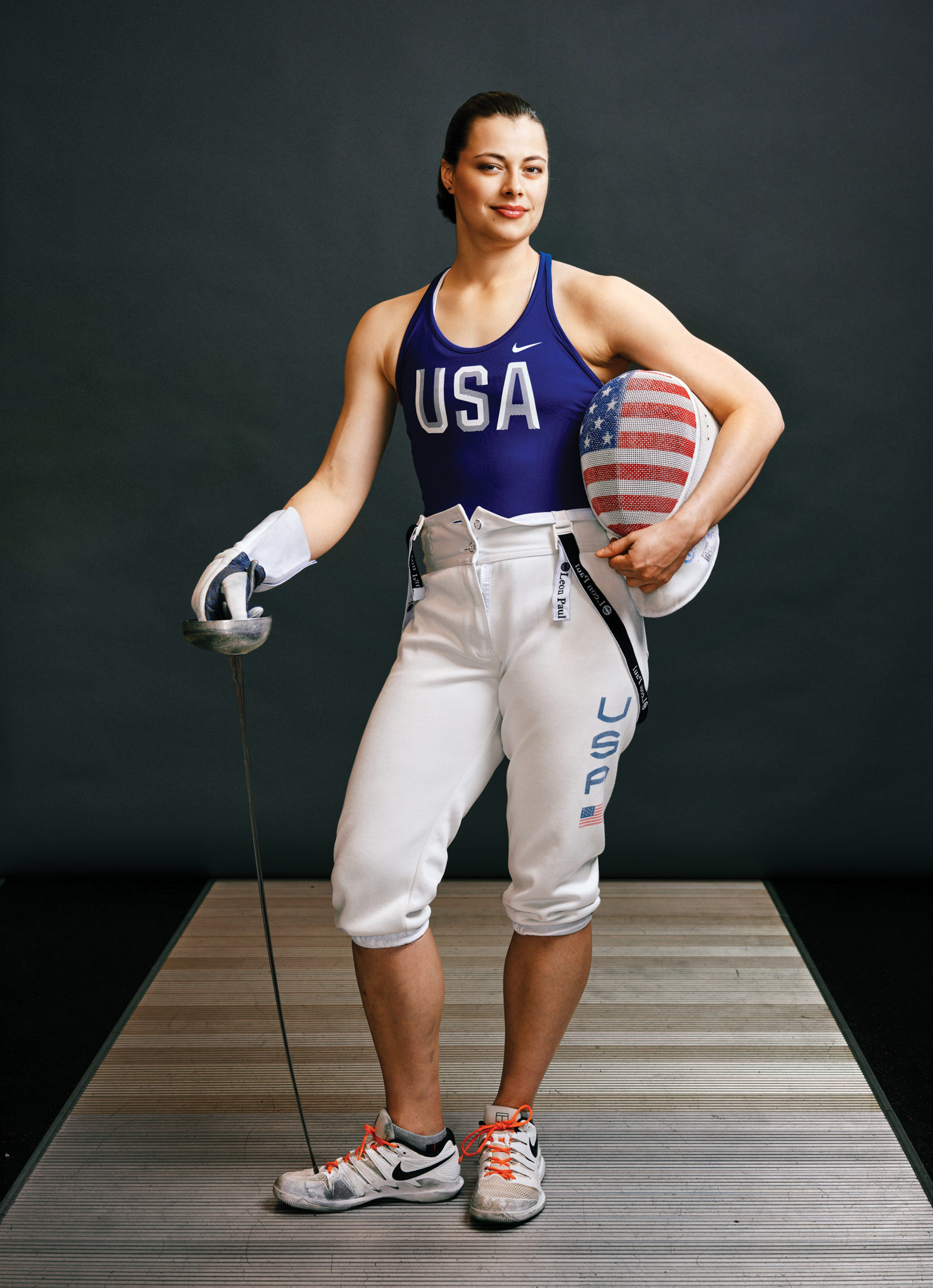
Mental Game
Her passion for fencing was seeded with a love of medieval studies and the fantasy book series The Song of a Lioness, about a young girl in medieval times who pretends to be a boy to become a knight. Holmes parents fully supported their daughter’s appetite to try something new. “I told them I wanted to fence, and they said, ‘Go for it.’ And I loved it right away. At first, I wasn’t necessarily better at it than the other sports I played, but I loved the cognitive component,” says Holmes. “They call fencing the chess of sports. When you’re younger, you’re playing basketball, tennis, or soccer—you kick the ball, and you hit the ball. But with fencing, there’s this puzzle before you. Plus, you’re using a sword, so as a kid that’s so cool.”
While she wasn’t immediately a standout fencer, she dedicated herself to learning the nuances of the sport, training 20 hours a week during her middle school years. She learned footwork and blade work, including the eight different fencing “parries” (or bladework maneuvers). By the time Holmes was 14, she won every single youth event she entered nationwide. “The next year, I came in second at the Cadet World Championships. I thought for the first time maybe this is something I can do for real,” says Holmes.
But in 7th grade, Holmes sustained a significant injury for the first time in her fencing career, and she had to see an orthopedic surgeon, which led to exposure in a field that she took to immediately. “For a 12-year-old, it was traumatic to go to an orthopedic surgeon. I wanted to understand what broke and what could I do to make it stronger?” Holmes recalls. “When the doctor saw that I was interested, he asked me if I wanted to shadow him when I got a little older, and I ended up following him in the clinic and operating room. I even saw a 7-hour scoliosis surgery. And I decided I was going to do that.”
Concussion Setback
During her sophomore year at Princeton University, Kat Holmes sustained a concussion after her opponent used an action called a fleche attack when you run at your opponent. “She hit me with the point, and I hit myself in the head with my own hand. At dinner, I started veering off from everybody and I was responding non-sensically. So, they took me to the non-athletic health center, and they ran me through the protocol,” says Holmes. “They asked me 3+9, and I couldn’t answer it. A few days later, I had to take all my finals, and my organic chem final didn’t go so well. The molecules were moving on the page. I was cleared by athletic medicine in 2 weeks, but it took 2 months to recover. I couldn’t even remember basic things.”
Emil Matarese, MD, the director of the concussion program at the Capital Institute of Neurosciences, says an extended recovery to concussion can happen in about 20 percent of cases. “We have long thought that a concussion is a temporary injury to the brain that will recover without residual deficits within a matter a time,” he says. “Most people will recover within about 3 weeks, however, an additional 20 percent have symptoms that go much longer,” says Dr. Matarese. “In some cases, symptoms can persist well over a year and can even be permanent. In Kat’s situation, there may have been localized scaring that prolonged her recovery phase.”
New studies and objective testing data are giving doctors more information about the causes and recovery patterns of concussions, which is resulting in more precise predictions of recovery time and protocol, he says. “Emerging studies will have an immense impact, such as helping us understand who can safely return to sports without significant impact on the brain.”
En Garde!
Although the U.S. team didn’t win Olympic gold in Rio, Holmes describes the experience as one of the best of her life. “I didn’t get to walk in the Opening Ceremonies because we were competing on that first day, but there is nothing like walking out on the Olympic stage when they first call your name,” she says. “That’s when you become an Olympian.”
With her specialty closing ability and overall fencing arsenal, Holmes will play a significant role when the team competes in Tokyo next summer, and she says they have a legitimate shot to win the gold medal. But whatever happens in 2020, she’s been an integral part of a team that’s etched its place in American women’s épée’s fencing. “As a team, we smashed all these barriers, and we are excited to see how high we can raise that bar for ourselves but also for the younger generations of women’s épéeists,” she says. “Individually, I think if I prepare to the best of my abilities, winning gold is something that could happen. Your goal should be to win. You have to trust that all that work you put in will get you there and also know that it still might not.”
But even with her sights set so high for the summer Olympics and the rest of her fencing career, Holmes has aspirations well beyond fencing. After earning her degree from Princeton University in neuroscience, she took her MCATs last January and applied to medical schools for the fall semester of 2020. In addition to her studies, since she sustained a concussion in her sophomore year, she’s worked in the concussion lab at Princeton.
And, somehow, Holmes still manages to find time for hobbies and a social life. “I admit I’m sort of addicted to working out. I actually met my boyfriend at the rock climbing gym,” she says. “Actually, did you know in 2020 rock climbing is going to be a new Olympic sport? I’m just sayin…”

